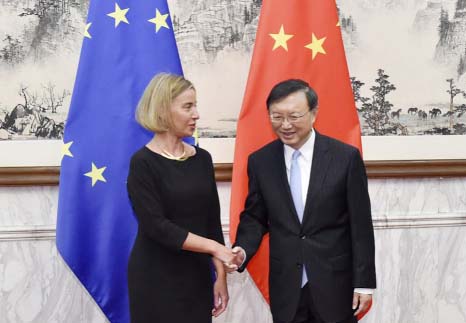
AP, Beijing :
EU foreign policy chief Federica Mogherini expressed concern Thursday about rising tensions over North Korea’s nuclear weapons program, and said China and Europe have a common responsibility to avoid a military escalation on the Korean Peninsula.
In a speech at Tsinghua University on her final day of a three-day trip to Beijing, Mogherini warned of the worldwide implications of a crisis on the peninsula.
“Everyone understands that the crisis with North Korea will have a global fallout,” she told students at the prestigious school that has produced many of China’s top leaders.
Mogherini said a remark from her 12-year-old daughter that China was in a region threatened by nuclear war underscored the importance of joint action to prevent the situation from further deteriorating.
“If a 12-year-old in Europe understands the risks of an escalation, (in) such a faraway place from home, it is quite self-evident that we have common responsibilities,” she said.
Mogherini said she discussed the issue of North Korea at length during her talks with Chinese officials in Beijing.
She said China and the EU had a “common responsibility and an interest to avoid a military escalation in the Korean Peninsula, to push for North Korea to abide by its international obligations and re-engage with the international community, and work together for a denuclearized Korean Peninsula.”
North Korea’s acceleration of its nuclear weapons program to the point where it may become capable of striking the U.S. is seen as pushing the peninsula toward its most severe crisis in years.
President Donald Trump has called for Beijing to use its influence as Pyongyang’s most important trading partner and ally to pressure North Korea to stop its nuclear and missile programs.
But Pyongyang has pressed ahead with missile launches and has been observed making preparations to test a sixth nuclear device.
U.S. Vice President Mike Pence said Wednesday on board an aircraft carrier in Tokyo Bay that any use of conventional or nuclear weapons by North Korea would be met with an “overwhelming and effective” response by the U.S. military.
EU foreign policy chief Federica Mogherini expressed concern Thursday about rising tensions over North Korea’s nuclear weapons program, and said China and Europe have a common responsibility to avoid a military escalation on the Korean Peninsula.
In a speech at Tsinghua University on her final day of a three-day trip to Beijing, Mogherini warned of the worldwide implications of a crisis on the peninsula.
“Everyone understands that the crisis with North Korea will have a global fallout,” she told students at the prestigious school that has produced many of China’s top leaders.
Mogherini said a remark from her 12-year-old daughter that China was in a region threatened by nuclear war underscored the importance of joint action to prevent the situation from further deteriorating.
“If a 12-year-old in Europe understands the risks of an escalation, (in) such a faraway place from home, it is quite self-evident that we have common responsibilities,” she said.
Mogherini said she discussed the issue of North Korea at length during her talks with Chinese officials in Beijing.
She said China and the EU had a “common responsibility and an interest to avoid a military escalation in the Korean Peninsula, to push for North Korea to abide by its international obligations and re-engage with the international community, and work together for a denuclearized Korean Peninsula.”
North Korea’s acceleration of its nuclear weapons program to the point where it may become capable of striking the U.S. is seen as pushing the peninsula toward its most severe crisis in years.
President Donald Trump has called for Beijing to use its influence as Pyongyang’s most important trading partner and ally to pressure North Korea to stop its nuclear and missile programs.
But Pyongyang has pressed ahead with missile launches and has been observed making preparations to test a sixth nuclear device.
U.S. Vice President Mike Pence said Wednesday on board an aircraft carrier in Tokyo Bay that any use of conventional or nuclear weapons by North Korea would be met with an “overwhelming and effective” response by the U.S. military.

